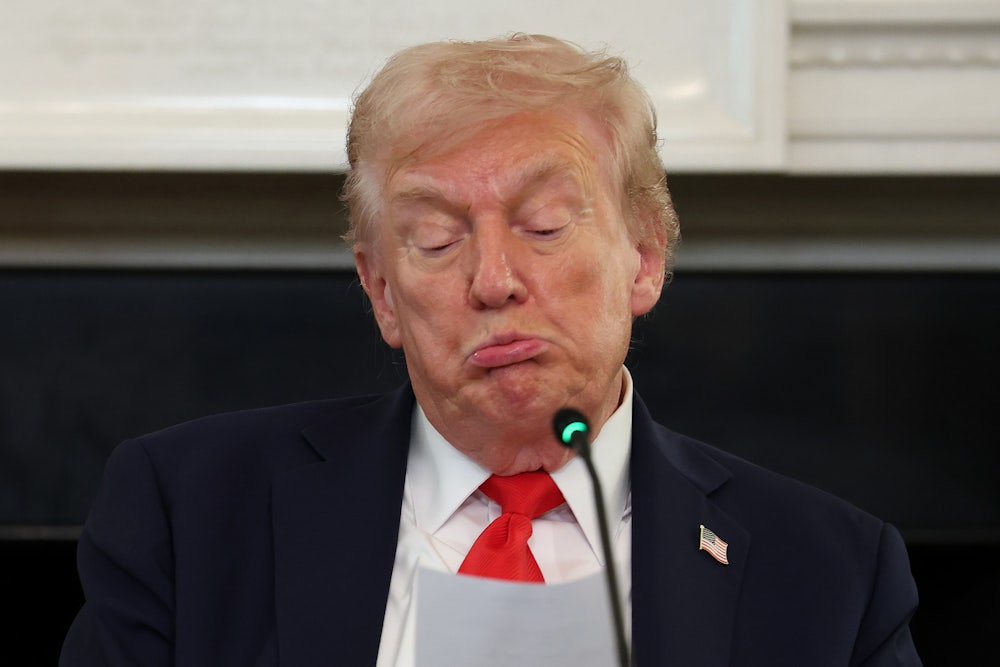On Friday, President Donald Trump got tantalizingly close to the Nobel Peace Prize he has been on a weird, quixotic quest to win since his second term began. Trump wasn’t recognized by the Norwegian Nobel Committee, but he was given a shout-out by its 2025 recipient, Venezuela’s Maria Corina Machado, a strident advocate for free-market ideals and a staunch opponent of Nicolás Maduro, the socialist dictator who has ruled her country since 2013.
“We are on the threshold of victory and today, more than ever, we count on President Trump, the people of the United States, the peoples of Latin America, and the democratic nations of the world as our principal allies to achieve Freedom and democracy,” Machado wrote on X. “I dedicate this prize to the suffering people of Venezuela and to President Trump for his decisive support of our cause.”
That is the best Trump could hope for, though he certainly will keep begging for the Nobel Prize in the coming year, pressuring foreign leaders to advocate on his behalf like a pleading toddler and threatening Norway with sanctions or worse. Trump will not win the prize even if the Gaza peace deal he helped broker between Israel and Hamas miraculously holds in 2026, because his other policies are pushing regions around the world—including Venezuela—very much in the opposite direction of peace.
The Nobel Peace Prize is one of the few truly genuine missions of Trump’s second term. He is often checked out in official meetings, and seems to have left the functioning of the government to Stephen Miller, his deputy chief of staff, and Russell Vought, the director of the Office of Management and Budget—who are using their power to inaugurate fascism and purge the bureaucracy. But Trump has earnestly pursued diplomacy in the Middle East while also desperately, embarrassingly campaigning for the prize.
Trump’s obsession with winning it is fairly easy to understand. Five years ago, he left office having accomplished very little besides a corporate tax cut that any Republican president would have signed into law. The legacy of that term was largely defined by the day-to-day chaos of his lead-by-tweet approach and two massive failures during his last year: his woeful mismanagement of a pandemic and his effort to overturn a legitimate election. The Peace Prize is tantalizing because it’s a tangible and rarefied accomplishment—proof that he’s a winner, not an incompetent loser. (And the man does love awards, so much so that he invents them to honor himself.) Also, Barack Obama won one.
Much of Trump’s diplomatic work suggests that he is both incompetent and a loser, however. He is fond of claiming that he has stopped seven wars and ended conflicts that had been ongoing for “decades”—like one between Azerbaijan and Armenia (which he almost always confuses with Albania). For the most part, though, Trump’s work has consisted of swooping in to help halt relatively minor escalations. The full-fledged wars that he promised to end on his first day in office on the campaign trail last year—in Ukraine and Gaza—are still very active and only recently paused, respectively. After eight months of costly dithering, he has finally begun aiding Ukraine against Russian invaders, albeit to a lesser extent than his predecessor. In Gaza, the recent truce is a positive sign—and an accomplishment that Joe Biden could not achieve, due to a combination of his own spinelessness and Benjamin Netanyahu’s eagerness to continue the conflict (and aid Trump’s reelection effort).
It’s unlikely that the Gaza peace deal will hold—Netanyahu clearly wants to continue the war, and the thorniest part of the negotiations are yet to come—but even it does, Trump will never win the Nobel for a simple reason: He is running an increasingly violent, murderous, and despotic government. Masked goons from the Department of Homeland Security are kidnapping and disappearing people from the streets, shooting priests with pepper balls, and handcuffing naked children. He is ordering the wanton bombing of small boats off the coast of Venezuela and Colombia, claiming that they are filled with drugs and “narcoterrorists” without providing any evidence, in clear violation of U.S. and international law. And his administration is inching closer to war in Venezuela.
The fact that Machado was awarded the prize may ironically make that war more likely. She advocates for regime change in Venezuela, though she has stopped short of endorsing a U.S.-led overthrow—but she has endorsed America’s extralegal strikes in the Caribbean, claiming that they are necessitated by Maduro’s oppressive narcoterrorist government. By endorsing her project, the Nobel Committee has given it greater legitimacy. It has handed a potent argument to figures in the Trump administration, notably Secretary of State Marco Rubio, who are pushing the United States to remove Maduro from power through military force.
For these reasons, Machado might seem like an odd laureate. But in truth, looking to the past, the Nobel Peace Prize has never only been about peace. You can applaud the bombing of fishing boats and still win one—or, in the case of Henry Kissinger, you can order the secret bombing of a country not even involved in a war and still win one. Trump has blood on his hands, but that hasn’t stopped the Norwegian Nobel Committee before. So I guess there’s a glimmer of hope for Trump after all.
